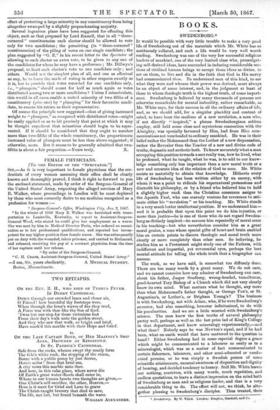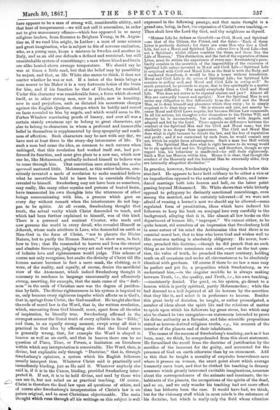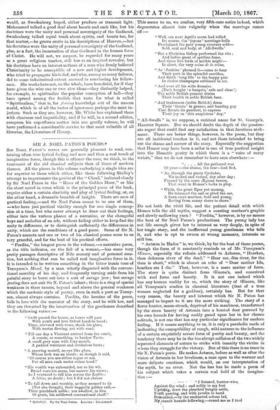BOOKS.
SWEDENBORG.*
IT would be possible with very little trouble to make a very good life of Swedenborg out of the materials which Mr. White has so assiduously collated, and such a life would be very well worth reading. Swedenborg was one of the very few successful religious leaders of mankind, one of the very limited class who, promulgat- ing self-derived ideas, have succeeded in inducing considerable sec- tions of civilized human beings to accept those ideas as divine, to act on them, to live and die in the faith that God in His mercy had communicated them. To understand men of this kind, to see what they were and whence their power was derived, must always be an object of some interest, and, in the judgment at least of those to whom theologic truth is the highest truth, of some import- ance. Swedenborg is believed by many thousands of persons not otherwise remarkable for mental imbecility, rather remarkable, as- Mr. White says, for their success in all the ordinary affairs of life, and, as we should add, for a singular placidity and content of mind, to have been the medium of a new revelation, a man who, if not directly "inspired," a phrase Swedenborgians seldom employ, still held some close and mysterious connection with the Almighty, was specially favoured by Him, had from Him com- munications not vouchsafed to ordinary mankind. He was in their- belief rather the Mohammed than the Luther of a new dispensation, rather the Revealer than the Teacher of a new and divine code of truths, dogmatic and aesthetic both. To know accurately what a man occupying this position towards a sect really was, how he lived, what he professed, what he taught, what he was, is to add to our know- ledge something only lees important than a new moral truth or a new and accurate idea of the relation of God to man. Mr. White assists us materially to obtain that knowledge. Hitherto every life of Swedenborg has been written either by an enemy, with whom it was a point to ridicule his supernatural pretensions and discredit his philosophy, or by a friend who believed him to hold a slightly higher rank than the Christian consensus assigns to the Apostle Paul, who can scarcely venture for reverence to esti- mate either his " revelation " or his teaching. Mr. White stands in a very much better intellectual position. If we understand him— and it is probable that upon this point we do him injustice, or more than justice—he is one of those who do not regard Sweden-- borg as divinely inspired—he accuses him repeatedly of moral error in his teaching—but who nevertheless consider him as a great moral genius, a man whose special gifts of heart and brain enabled him on certain points to discern theologic and moral truth more - clearly or more completely than other men. So believing, he studies him as a Protestant might study one of the Fathers, with indifferent and impartial, yet reverential eyes, perhaps the best mental attitude for telling the whole truth that a biographer can assume.
The work, as we have said, is somewhat too diffusely done. There are too many words by a great many. We do not care, and we cannot conceive how any admirer of Swedenborg can care, about his father, Jasper Svedberg, wrong-headed, tumultuous, good-hearted Tory Bishop of a Church which did not very clearly know its own mind. What matters what he thought, any more than what Mohammed's father thought, or George Fox's, or St. Augustine's, or Luther's, or Brigham Young's? The business is with Swedenborg, not with Adam, who, if he were Swedenborg's ancestor, had also something, however infinitesimal, to do with his peculiarities. And we are a little worried with Swedenborg's science. The man knew the first truths of natural philosophy pretty well, perhaps as well as the last prize lad of King's College in that department, and knew mineralogy experimentally,—and_ what then? Nobody says he was Newton's equal, and if he had been, what on earth would that have mattered to the question in band? Either Swedenborg had in some especial degree a grace which might be communicated to a labourer as easily as to a mineralogist, which was as a matter of fact communicated to certain fishermen, labourers, and other semi-educated or unedu- cated persons, or he was simply a Swedish person of some scientific attainments, unusual sweetness of disposition and dignity of bearing, and decided tendency to lunacy. Still Mr. White leaves . out nothing, contrives, with many words, much repetition, and endless quotations, to leave a distinct impression on the mind both of Swedenborg as man and as religions leader, and that is a very - considerable thing to do. The effect will not, we think, be alto- gether pleasing to Swedenborg's disciples. Thus treated, their • Becedtntorg. By W. While. London: SImpkin, Marshall, and Co. hero appears to be a man of strong will, considerable ability, and that heat of temperament—we will not call it sensualism, in order not to give unnecessary offence—which has appeared in so many religious leaders, from Socrates to Brigham Young, in St. Augus- tine as, if we read him aright, in Luther ; a man of some science and great imagination, who is subject to fits of nervous exaltation, who, as a young man, keeps a mistress in Sweden and another in Italy, and as an old one defends a defined and restricted, but still unmistakable system of concubinage; a man whose blood and brain are alike heated above average temperature. We should say he was at times a little mad, but that the belief may by possibility be unjust, and that, as Mr. White also seems to think, it does not matter whether he was or not. If a lesion of the brain brings a man nearer to his Maker it is a very fortunate lesion of the brain for him, and if his function be that of Teacher, for mankind. Under this character was considerable force, a force which showed itself, as in other strong men, now in pride, now in humility, now in mad prejudices, such as dictated his monstrous charges against the English Quakers, charges which he boldly said rested on facts revealed to him by angels, and which would seem to Dr. Forbes Winslow convincing proofs of lunacy, and over all was a certain stately sweetness apt to belong to great characters, apt also to belong to characters in whom a profound and immovable belief in themselves is supplemented by deep sympathy and readi- ness of affection. Such characters may be met with any day, we have met at least three in the every-day intercourse of life. To such a man had come the idea, so common to such natures when unhinged, that this revelation had worked itself, out, had per- formed its function, and must give place to a new one, which new one he, like Mohammed, gradually induced himself to believe was to come through him. That conviction once attained, the modes operandi mattered little. Mohammed, as this writer believes, con- sciously invented a mode of revelation to make mankind believe what he nevertheless held to have been in essentials divinely revealed to himself. Swedenborg may not have been so conscious, may really, like many other mystics and persons of heated brain, have transmuted his own thoughts into the utterances of other beings communicating with him, a process which goes on every day without remark when the interlocutors do not hap- pen to be spirits. At all events, Swedenborg thought that truth, the actual verity which Christ descended to teach, and which had been further explained to himself, was of this kind. There is a personal and sentient Creator, who made and now governs the world in every detail, who revealed Himself as Jehovah, whose main attribute is Love, who descended on earth as Man-God in the form of Christ, "not to placate the Divine Nature, but to purify the Human Nature," to show men, in fact, how to live ; that He reascended to heaven and lives the eternal and absolute Sovereign, judging every act and word as a sovereign of infinite love and righteousness would judge. This scheme of course not only recognizes, but exalts the divinity of Christ till His human nature becomes in fact a mere mask, the clothing, as it were, of the reality, and equally, of course, denies the sacrificial view of the Atonement, which indeed Swedenborg thought it necessary to condemn in language unnecessarily and offensively strong, asserting, for example, that the main cause of the " dark- ness " in the souls of Christian men was the dogma of justifica- tion by faith. The divine righteousness in his system is imputed to us, only because every righteous impulse which affects us is God's, that is, springs from Christ, the God manifest. He taught also that the code of moral law is the Word, that is, the written revelation, which, emanating from God himself, must, apart from all theories of inspiration, be literally true. Swedenborg affirmed in the strongest manner the literal truth of every syllable in the "Bible," and then, in an equally strong manner, swept away all that is practical in that idea by affirming also that the literal sense is generally wrong, that, for example the Word is obeyed in heaven as well as on earth, and that in heaven there can be no question of Place, Time, or Person, a limitation on literalness within which any interpretation is conceivable. The Word, then, is divine, but explicable only through "Doctrine," that is, through Swedenborg's opinions, a system which his English followers usually interpret thus. Whatever Christ said is practically and immediately binding, just as He said it. Whatever anybody else said is, if it is in the Canon, binding, provided Swedenborg inter- preted it. If not, it is to be held divine, and used by those who can use it, but not relied on as practical teaching. Of course, Christ is therefore the final law upon all questions of ethics, and of course also Swedenborg's interpretation of Christ's law is on points original, and to most Christians objectionable. The main thought which runs through all his writings on this subject is well expressed in the following passage, and that main thought is a grand one, being, in fact, the expansion of Christ's own teaching,— Thou shalt love the Lord thy God, and thy neighbour as thyself.
"Human Life he defines as threefold—as Civil. Moral, and Spiritual —as that of the Citizen, the Friend, and the Each of these Lives is perfectly distinct; for there are some Men who live a Civil Life, but not a Moral and Spiritual Life ; others live a Moral Life—but not a Spiritual ; whilst others combine the three, and these live the Life of Heaven.' This distinction, and the fact of the separation of these Lives, must lie within the experience of everyone: Swedenborg's pecu- liarity consists in the assertion of the impossibility of the existence of Spiritual Life unless invested in Moral and Civil Life= Spiritual Life is conjoined with Civil and Moral Life as the Soul is with the Body, and if sundered therefrom, it would be like a house without foundation. Moral and Civil Life is the action of Spiritual Life; for Spiritual Life consists in willing wek and Moral and Civil Life in acting well.' So much premised, he proceeds to argue, that to live spiritually is a matter of no great difficulty. For nearly everybody lives a Civil and Moral Life. Who does not strive to be reputed sincere and just? Almost all Men are outwardly honest and upright.' Now the Spiritual Man is not under any obligation to live differently from the Civil and the Moral Man, or to deny himself any pleasures which they enjoy ; he is simply required to be what they seem. He is sincere and just, not merely be- cause Moral and Civil Laws require, but because Divine Law commands. In all his actions, his thoughts refer themselves to the Divine Will, and thereby he is unconsciously, but actually, united with Angels, and adopted and led by the Lord. Thera appears no difference between the conduct of the Spiritual Man and the Civil and Moral man ; but the similarity is no deeper than appearance. The Civil and Moral Man does what is right because he dreads the law, and the loss of reputation and profit ; and if not restrained by such fears, he would commit any act, which he might deem advantageous. Such a man has Hell within him. The Spiritual Man does what is right because to do wrong would be to sin against God and his Neighbour ; and therefore, though no eye regard him, his behaviour is unaffected—he still deals righteously. Such a Man has Heaven within him. Hence it is clear, that though the conduct of the Heavenly and the Infernal Man be externally alike, they are internally altogether dissimilar.'" In practice, however, Swedenborg's teaching descends below this standard. He appears to have held celibacy to be either a vice or an imperfection opposed to the natural order of affairs, and intro- duced marriage both into heaven and hell, on the latter point passing beyond Mohammed. Mr. White shows that while bitterly opposed to polygamy he distinctly sanctioned concubinage, even among the married, and he certainly tolerated—if we were not afraid of rousing a hornet's nest we should say he allowed—some- regulated form of prostitution, ideas which have induced his followers to keep his book on conjugal love very carefully in the background, alleging that it is, like almost all law books on this department of human life, "improper." We cannot either, to be quite honest, rid ourselves of an impression that Swedenborg held in some corner of his mind the Antinomian idea that there is no essential moral law, that to him who loves God and wishes well to His creatures nothing is absolutely obligatory.' He never, how- ever, preached this doctrine,—though he did preach that no such thing as an intuitive conscience can exist,—and on the test ques- tion, the value of truth, he preached the exact contrary, holding truth on all occasions and under all circumstances to be absolutely identical with goodness. Of course if there be no law a man may be perfect and yet lie, a proposition which Swedenborg, as we understand him,—in the singular muddle he is always making between Truth, i.e., the quality, and Truth, i.e., his own teaching, —consistently denied. The good, on his system, go direct to a heaven which is partly spiritual, partly Mohammedan ; while the bad descend to a hell deprived of all its horrors by the assertion that they like it, and select it in preference to heaven. Besides this great body of doctrine, he taught, or rather promulgated, a number of ideas about the spirit life and the relations of matter to spirit upon which his followers lay great stress, but which may also be classed in two categories—as statements intended to prove his divine authority as a Revealer, and false scientific propositions stated as heaven-derived religious truths, e.g., his account of the interior of the planets and of their inhabitants.
The causes of the success of Swedenborg's teaching, such as it has been, may, we think, be comprehended from this short statement. He formulized the recoil from the doctrine of justification by the sacrifice of the innocent for the guilty, and accounted for the presence of God on earth otherwise than by an atonement. Add to this that he taught a morality of exquisite benevolence save where it presses on women, the exact point about which average humanity cares least, and that he clothed his teaching in dreamy nonsense which greatly interested excitable imaginations, nonsense about the correspondences of the animate and inanimate, the in- habitants of the planets, the occupations of the spirits of the dead, and so on, and we only wonder his teaching had not more effect than has hitherto been the case. It would have had, we think, but for the visionary stuff which in most minds is the substance of his doctrine, but which is really only the fluid whose vibration
would, as Swedenborg hoped, either produce or transmit light. Mohammed talked a good deal about houris and such like, but his doctrines were the unity and personal sovereignty of the Godhead, Swedenborg talked equal trash about spirits, and houris too, for that matter,—he grows erotic in his descriptions of Heaven,—but his doctrines were the unity of personal sovereignty of the Godhead, plus, as a fact, the incarnation of that Godhead in the human form of Christ. He will not, we suspect, be regarded for many years as a great religious teacher, still less as an inspired revealer, but his doctrines have an interest as those of a man who firmly believed Christianity to be susceptible of a new and higher development, who tried to propagate his belief, and who, among so many failures, did to some infinitesimal extent succeed in convincing his fellow- men. His works have not, on the whole, been beneficial, for if they have given the wise one or two n'ew ideas—they distinctly helped, for example, to spiritualize the popular conception of hell—they have spread among the foolish that taste for what is called "Spiritualism," that is, for forcing knowledge out of the unseen world, which is of all the tastes of ignorance perhaps the most in- jurious. Such as they are, however, Mr. White has explained them with clearness and impartiality, and if he will, in a second edition, compress his superfluous matter into one goodly volume, he will have performed a considerable service to that most valuable of all libraries, the Literature of Heresy.




































 Previous page
Previous page